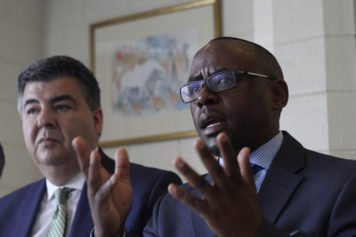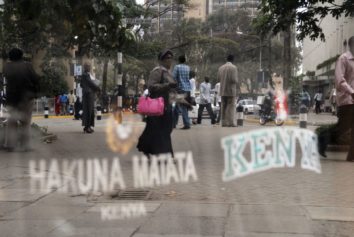In the gritty Kenyan port city of Mombasa, Phyllis Omido knew that industry could pose a danger to the surrounding communities. She’d worked on environmental impact assessment reports for several factories.
But when her 2½-year-old son, King David, got sick with a mysterious condition, it didn’t occur to her that it might be from environmental toxins. He had a high fever that wasn’t responding to medication. He couldn’t sleep. He was plagued with diarrhea, and his eyes became runny. He spent two weeks in the hospital, and still no one could figure out what was wrong.
“The doctors had failed to find malaria, typhoid, the normal diseases they usually test for,” Omido says. A colleague who was visiting her in the hospital asked about lead exposure. At the time Omido was working as an office administrator for EPZ Refinery in Mombasa, which melted down used car batteries and sold the scrap lead for export.
“That was the first time it crossed my mind that maybe it could be lead poisoning,” she says. And it turned out she was right.
When King David got sick, she was still breast-feeding him. Most days his baby sitter would bring him to her office at lunchtime. He’d also come by in the evening, she says, “When the lady left for her home, she’d drop him at the office.”
After she got his diagnosis, she felt guilty.
“It was very heartbreaking for me,” the 36-year-old single mother says, “because I felt like I was the one who’d made him sick.” While her breast milk could have contained lead, it’s also possible there was lead in the air and dirt around their home.
Then her reaction turned to anger. She quit her job and demanded that the company pay her son’s medical bills. They agreed to pay her an amount equal to the hospital bill but labeled it a severance payment. They also demanded that she sign a non-disclosure agreement. She signed it, then immediately violated it.
Omido launched a campaign to shut down the battery recycling operation entirely. In the slum of Owino Uhuru, where the smelter was based, she told anyone who would listen that the plant was emitting toxic levels of lead. She called on health officials to intervene. She got arrested protesting against the refinery.
After a five-year battle, the plant closed last year. This week in recognition of her efforts, Omido was named the 2015 Africa winner of the prestigious Goldman Environmental Prize, which comes with $175,000 to pursue her “vision of a renewed and protected environment”.
Read the full story at npr.org



